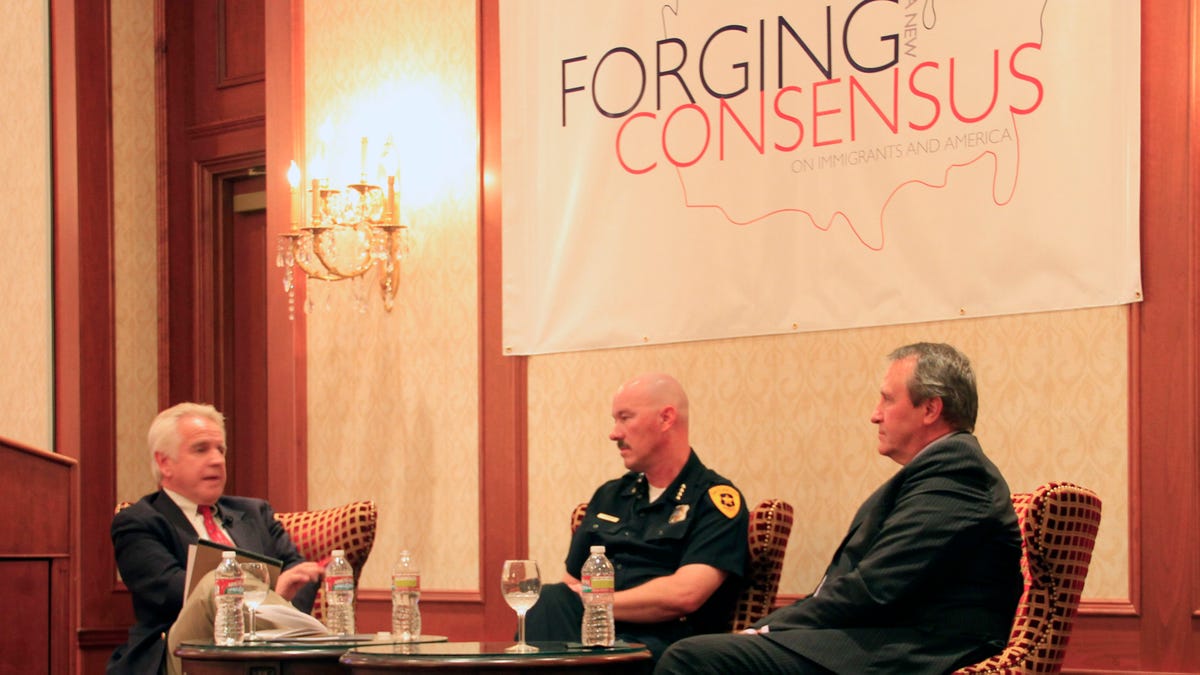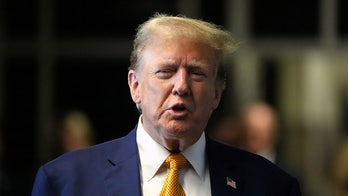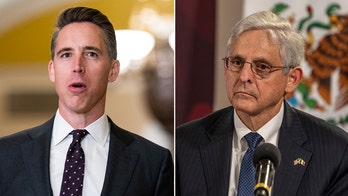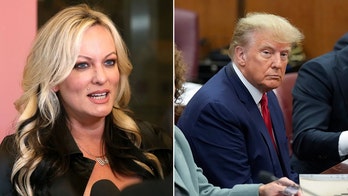
Doug Wright (left), a Utah radio show host, moderates a panel with Salt Lake City Police Chief Chris Burbank (middle), and Utah Attorney General Mark Shurtleff (right), as they discuss the effects that an enforcement-only immigration policy would have on police. (Angela M. Santos)
Leaders from four states in the Mountain West —Utah, Idaho, Colorado and Wyoming— gathered in Salt Lake City on Wednesday to discuss immigration in hopes of reaching an agreement on reform.
In a discussion on enforcement-only policy, Salt Lake City Police Chief Chris Burbank said if Utah were to require police to take immigration enforcement into their own hands, it would hurt public safety.
According to Burbank, a great majority of the people who tip off police about crimes in Utah are undocumented immigrants. If police were in charge of enforcing legal status, he said, immigrants would be too afraid to speak up.
"They won't trust law enforcement. They won't come to us when they know if their neighbor is committing a crime, or dealing meth, or doing whatever." he said, "Because then they're afraid then they'll be processed."
He said his focus, as a policeman, is to enforce local laws — not federal laws.
"Immigration enforcement does not enhance my ability to go deal with criminals," said Burbank.
Participants generally opposed the strict enforcement laws passed in Alabama and Arizona. Instead, they pointed to bills passed in Utah that included an enforcement law modeled on Arizona's but balanced by a program that will allow illegal immigrants to work and pay taxes in Utah if they register with the state.
The law does not protect them from federal prosecution; the state is looking for a federal solution before the law goes into effect in 2013.
The Utah guest-worker program was a key component of one the measures, HB 116, an initiative pushed as a compassionate way to handle immigration.
Salt Lake County Jail is already overcrowded as it is, according to Burbank.
He says the jail already releases criminals because there isn't enough room to house them all. If police had to detain all undocumented immigrants they encountered, he said, they would be forced to allow even more criminals to go free in order to lock undocumented immigrants away.
"The idea that somebody, because of their status would have fewer rights than somebody who just committed a homicide is offensive to me," said Burbank.
He said having local police in charge of checking people's immigration status also sends the wrong message to officers. According to Burbank, in states that have enforcement-only laws, police often make stops based on color.
"Driving while black in a white neighborhood is not against the law, nor is being Hispanic in Utah," said Burbank.
Burbank says that while he is not for enforcement only laws, illegal immigration is still a problem. However, it should not be an issue that local law enforcement can possibly tackle.
"It's got to be federally solved," Burbank said, "or we're going to cause more problems."
Although Salt Lake City's Police chief is against enforcement-only law in Utah, there are several Utah political leaders who think enforcement-only laws are a good idea.
Utah Rep. Chris Herrod, Republican, was not at the summit but has been a vocal part of the immigration debate. He said that he is for legal immigration. In fact, he says his wife is a legal immigrant from Ukraine.
"I believe in immigration and I believe that's one of the things that’s made this country great," he said.
Herrod said it's the illegal immigration that is a problem in Utah.
"The problem is if you don't have enforcement, the problem will continue to get worse," said Herrod.
He argued that many federal laws are enforced by local police. Bank robbery, he said, is a federal crime, yet, local police step in to stop bank robberies. They should also be able stop illegal immigration, according to Herrod.
He says an enforcement-only law will ease the country of undocumented immigrants, and in turn, give the people who have been patiently waiting to receive visas the opportunity to come here. He says that letting undocumented immigrants stay in the U.S., gives those who are trying to come here the legal way a disadvantage.
"I wish we cared equally about the Russian, or the Asian, or black African [who are waiting in their countries for visas] as those who've broken the law and are here right now," said Herrod.
He says he wants to remove unauthorized immigrants from the U.S. in order to have room to help those who are trying to come into the U.S. legally.
"I just get frustrated when the one side continues to demonize the other as not caring or compassionate or Christian," he said.
Participants also discussed the economic impact of immigrants and state efforts to enact their own immigration laws.
The impact of enforcement-only immigration laws has been immediately evident in Georgia, where the agricultural industry estimates it has lost at least $300 million and as much as $1 billion since laws targeting undocumented immigrants passed this year.
Utha's Attorney General Mark Shurtleff , who hosted the Mountain West Immigration Summit, said lawmakers should approach immigration with humanity and compassion.
"We're a special place. We pride ourselves on bringing people from all over the world and they make us better," said Shurtleff. "And yet there's so many people who talk about 'We don't want the third world values of Mexico to come here,' when there's 40,000 Mexicans dead, in the last few years, because of our drug habits in the United States of America."
Shurtleff is a supporter of the Utah Compact, a document that promotes a "rational" immigration debate. He says he hopes that the document will be a basis for nationwide immigration reform.
The Utah Compact is based on five principles: federal solutions, law enforcement, families, economy, and a free society. The Compact promotes ideas such as keeping families together and integrating immigrants into society.
Shurtleff said he hopes the Utah Compact will become a model for the nation, and a model for policy making. He said he is talking to leaders across the nation about the Compact and it's been a positive experience. Shurtleff claims that he has already influenced Indiana's Attorney General Greg Zoeller to support a similar Indiana Compact, and he plans to talk personally with other Attorneys General across the nation in order to rally their support.
"We are here on the ground. We live these issues every day. We can find an example that will work nationally," said Shurtleff.
This story contains material from The Associated Press.
Angela M. Santos is a freelance reporter based in Utah.
Follow us on twitter.com/foxnewslatino
Like us at facebook.com/foxnewslatino




